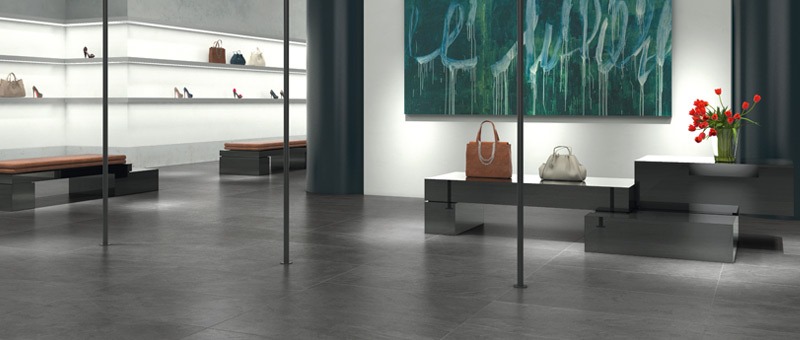
Slate is an undeniably beautiful natural stone, but it does have some flaws that make it a problematic choice when tiling a large area. By understanding the different qualities of natural slate and porcelain slate tiles you can make a more educated choice about which tiles are right for your floor.
How is natural slate formed?
Slate is formed underground when minerals and sediments are compressed under intense heat and pressure; these sediments and minerals can be anything from chlorite to mica meaning that natural slate can have a lot of inconsistencies in its colour, quality, and porosity. No two natural slate tiles will be the same.
How are vitrified porcelain tiles made?
Vitrified porcelain tiles are made from clay and water that (much like slate) is put under immense heat and pressure to create a durable, aesthetically pleasing tile. The difference is that the components that make up vitrified porcelain tiles are controlled to ensure that the slate effect tiles have a more uniform appearance and are more structurally consistent.
Maintenance
Maintenance is often a factor that weighs heavily on people’s minds when they’re looking to choose the right material for their floors. Natural slate is quite a crumbly stone. This means that to keep natural slate floors looking their best you’ll need to regularly sweep and seal them– this can be time-consuming and costly. The brittle nature of slate also makes it prone to cracks and chips. These tiles can be hard to replace because the appearance of them is so varied.
On the contrary, slate effect porcelain tiles require almost no maintenance, simply give them the occasional wipe over and they’ll continue to look gorgeous for years to come. Porcelain is far more durable than slate meaning it is less prone to scratching or chipping and therefore, won't need replacing as often (if at all).
Porosity
As previously mentioned, slate tiles can range from incredibly porous to not very porous at all due to the way slate is formed. This does mean that some slate tiles are very prone to staining and others are not. This can make installing slate tiles in your kitchen or living room (where coffee and food spills are likely to occur) can be a risky move, but it really does depend on the qualities of the particular slate you’re installing. PrimaPorcelain’s slate tiles are notorious for their water-resistance, meaning they are far less likely to stain.
Can slate be installed outdoors?
Slate can be installed outdoors but can become very slippery when wet, a definite issue if you install them anywhere in the United Kingdom. PrimaPorcelain offers two thicknesses of slate porcelain tiles (10mm and 20mm) both of which offer excellent slip resistance making them the perfect choice for creating a visual flow from your inside to your outside space - a clever way to enhance the dimensions of your home.
- Consistent in colour and structure
- Incredibly easy to maintain
- Water-resistant
- Perform well indoors and outdoors
- Available in a range of colours
Do you think PrimaPorcelain slate tiles are the right option for you? If so, take a look at our slate range by clicking the button below:
View our Porcelain Slate Range here >